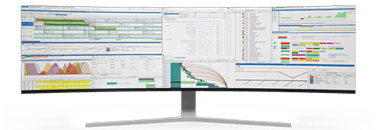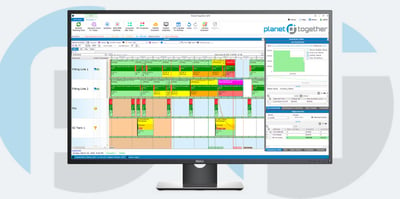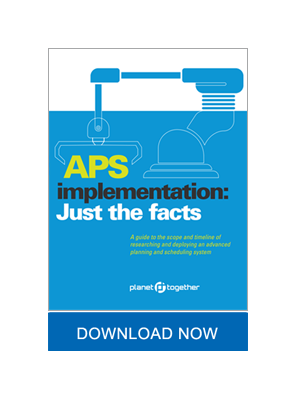Yield Optimization
In the landscape of medical manufacturing, yield optimization is not just a buzzword—it's a critical imperative. As a Production Planner in a medical manufacturing facility, you're well aware that optimizing yield isn't merely about maximizing production output; it's about ensuring the highest quality, regulatory compliance, cost-effectiveness, and maintaining patient safety. In today's competitive market, achieving these goals demands more than just manual planning and production scheduling—it necessitates the integration of advanced software solutions like PlanetTogether with ERP, SCM, and MES systems.
In this blog, we will look into the world of yield optimization in medical manufacturing. We'll explore the challenges you face, the role of technology in addressing these challenges, and how integrating PlanetTogether with ERP (Enterprise Resource Planning), SCM (Supply Chain Management), and MES (Manufacturing Execution System) systems can be the game-changer your facility needs.

Challenges in Medical Manufacturing
Medical manufacturing is a unique sector with its own set of challenges. From strict regulatory compliance to varying demand patterns, production planners often find themselves in a complex environment. Here are some key challenges you face:
Regulatory Compliance: Medical devices and pharmaceuticals are subject to stringent regulatory requirements, such as the FDA's Current Good Manufacturing Practices (cGMP). Ensuring compliance while optimizing yield can be daunting.
Variable Demand: The demand for medical products can fluctuate unpredictably. From sudden surges during health crises to seasonal variations, production planning must adapt to these changes without compromising efficiency.
Inventory Management: Managing inventory levels efficiently is crucial. Overstocking can lead to wastage, while understocking can disrupt production and customer deliveries.
Resource Allocation: Efficient utilization of resources, including labor, machinery, and materials, is essential. Balancing resource allocation with production targets is a constant challenge.
Batch Sizing: Determining the optimal batch size for production is crucial for both yield optimization and cost control. A suboptimal batch size can lead to production inefficiencies.
![]()

Role of PlanetTogether in Yield Optimization
PlanetTogether is an advanced production planning and scheduling software designed to address the challenges faced by medical manufacturing facilities. Here's how it can help:
Demand Forecasting: PlanetTogether uses sophisticated algorithms to analyze historical data and predict future demand accurately. This enables you to plan production proactively, reducing lead times and minimizing stockouts.
Capacity Planning: The software allows you to optimize your production capacity based on real-time data, ensuring that you allocate resources efficiently and meet production targets.
Inventory Optimization: By synchronizing demand forecasts with inventory levels, PlanetTogether helps maintain the right balance. It minimizes overstocking and understocking, reducing waste and costs.
Regulatory Compliance: PlanetTogether incorporates regulatory constraints into its planning algorithms, ensuring that your production processes adhere to cGMP and other regulations.
What-If Analysis: The software enables you to conduct what-if scenarios to assess the impact of different decisions on yield, resource utilization, and cost. This helps in making informed decisions.

Integration of PlanetTogether with ERP, SCM, and MES Systems
Depending on your existing infrastructure and preferences, there are several integration options available when connecting PlanetTogether with ERP, SCM, and MES systems. Some popular choices include:
SAP Integration: SAP is a leading ERP system, and integrating it with PlanetTogether provides a robust end-to-end solution for medical manufacturing facilities. Data synchronization ensures that production plans align with business objectives and compliance requirements.
Oracle Integration: Oracle offers a comprehensive suite of ERP and SCM solutions. Integrating Oracle with PlanetTogether enhances production visibility, supply chain coordination, and decision-making capabilities.
Microsoft Dynamics Integration: Microsoft Dynamics provides ERP and CRM solutions, and integration with PlanetTogether offers a user-friendly interface for managing production processes. It streamlines operations and supports compliance.
Kinaxis Integration: Kinaxis RapidResponse is a specialized SCM and supply chain planning platform. Integrating Kinaxis with PlanetTogether optimizes demand forecasting and supply chain coordination, leading to better yield outcomes.
Aveva Integration: Aveva offers MES and asset performance management solutions. Integrating Aveva with PlanetTogether enhances production execution and monitoring, improving efficiency and quality control.
Custom Integration: Depending on your specific requirements, you may choose to develop a custom integration solution. This approach allows you to tailor the integration to your facility's unique needs.
Benefits of Integration
While PlanetTogether is a powerful tool on its own, its true potential is unlocked when integrated with your existing ERP, SCM, and MES systems. Let's explore the benefits of such integration:
Seamless Data Flow: Integration ensures that critical data, such as inventory levels, production schedules, and demand forecasts, flows seamlessly between systems. This eliminates data silos and reduces manual data entry, minimizing the risk of errors.
Real-Time Visibility: By integrating with ERP and MES systems, PlanetTogether provides real-time visibility into your production processes. This means you can monitor progress, detect bottlenecks, and make adjustments in real time.
Improved Decision-Making: The integration allows for the exchange of data between systems, enabling you to make decisions based on accurate, up-to-date information. This leads to better resource allocation and yield optimization.
Enhanced Traceability: In medical manufacturing, traceability is paramount. Integration between systems ensures that you can trace the production history of each product from raw materials to the finished product, aiding in quality control and compliance.
Reduced Lead Times: With integrated systems, you can streamline order processing and reduce lead times. This means you can respond quickly to changing demand patterns and deliver products to customers on time.
Yield optimization in medical manufacturing is not a luxury—it's a necessity. The complex and highly regulated nature of the industry demands a sophisticated approach to production planning and scheduling. PlanetTogether, when integrated with ERP, SCM, and MES systems like SAP, Oracle, Microsoft, Kinaxis, or Aveva, can be the catalyst for transformative change in your facility.
By harnessing the power of data synchronization, real-time visibility, and informed decision-making, you can streamline operations, reduce costs, maintain regulatory compliance, and ultimately achieve higher yield rates.
Embrace the future of medical manufacturing by embracing integrated solutions like PlanetTogether, and unlock a new era of efficiency and profitability in your facility.
Are you ready to take your manufacturing operations to the next level? Contact us today to learn more about how PlanetTogether can help you achieve your goals and drive success in your industry.
Topics: Demand Forecasting, Regulatory Compliance, PlanetTogether Software, Integrating PlanetTogether, Improved Decision-Making and Agility, Enhanced Traceability, Real-Time Visibility and Control, Improved Decision-Making and Scenario Planning, Medical Manufacturing, Yield Optimization



















LEAVE A COMMENT